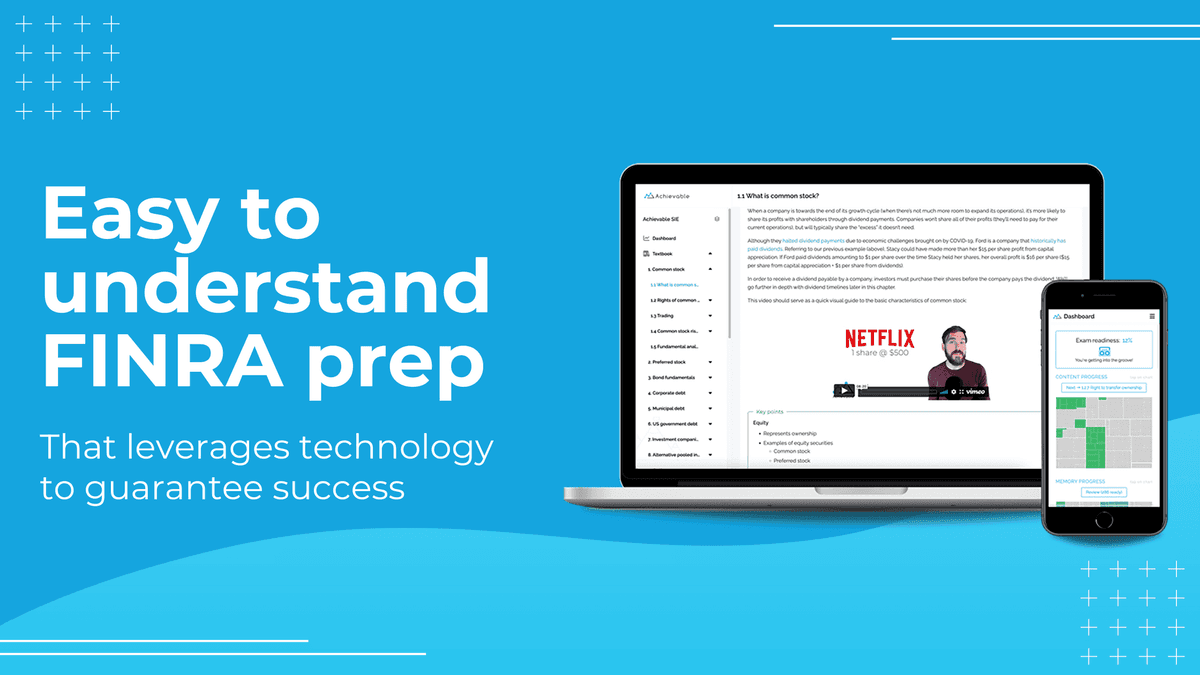
Series 6 or Series 7? This is a common question for new members of the securities industry when they’re debating which securities license to get. Passing either exam will make you a registered representative with FINRA, but the scope of what they cover, how difficult they are, and what their respective licenses allow you to do is quite different. In this post, we’ll break down all of the commonalities, differences, and which exam to take depending on where you want to take your career.
The Series 6 exam allows you to discuss and trade a limited set of securities products, which are:
The Series 7 is the “jack of all trades” securities sales licensing exam, allowing the representative to discuss and trade virtually any security. This includes the Series 6 products listed above, as well as:
The Series 6 and Series 7 exams are both Top-Off Exams administered by FINRA that are required in order to be fully licensed to sell (different types of) securities. Candidates cannot take either exam unless they are associated with and sponsored by a FINRA member firm or other applicable self-regulatory organization (SRO) member firm. For more information on registration requirements, refer to FINRA Rule 1210.
The FINRA SIE Exam is a corequisite to both exams, typically taken before the Series 6 or Series 7 Top-Off Exam. Candidates must pass both their Series 6/7 exam and the SIE exam to obtain their license. You do not need to be sponsored in order to sit for the FINRA SIE exam, so you can take it before applying to finance industry jobs. If you haven’t taken the FINRA SIE exam yet, Achievable offers a great FINRA SIE Exam prep course with industry leading pass rates.
Both exams are administered by Prometric Test Centers nationwide. You cannot sit for these exams online or take them in another testing location. Candidates are not permitted to bring reference materials to their testing session for either exam.
The Series 6 and Series 7 exams both cover the types of securities that you’re allowed to sell with your Series 6 license, which are: mutual funds; variable contracts (annuities and life insurance); unit investment trusts (UITs); and municipal fund securities (e.g., 529 plans).
Both of these exams have a lot of dry, legalese information to keep track of, which is why re-reviewing the material you’ve already learned is essential as you study. The math itself in each exam isn’t too difficult (no advanced math like Calculus), but applying it is tricky. They both require you to know the rules for making calculations related to the security types listed above.
The most important difference between the two exams is their scope. The Series 7 exam is much longer and larger than the Series 6 exam:
Series 6 Exam | Series 7 Exam | |
|---|---|---|
Time | 1 hour, 30 minutes | 3 hours, 45 minutes |
Questions | 50 | 125 |
Passing score | 70% (35/50) | 72% (90/125) |
Exam fee | $75 | $300 |
Co-requisite | Passed the FINRA SIE Exam | Passed the FINRA SIE Exam |
As you can see, the Series 7 exam has 2.5X more questions (125 vs. 50) and is 2.5X the length (3 ¾ hours vs. 1 ½ hours). It is also four times more expensive to take than the Series 6 exam ($300 vs. $75).
The Series 6 exam also contains 5 unscored, unidentified experimental questions that do not count towards your score, but are included in the exam randomly. The Series 7 contains 10 of these unscored questions.
The Series 6 exam is moderately difficult, with a recommended study time of 30-60 hours. The Series 7 exam is more challenging and typically takes much longer to both prepare for, with a recommended study time of 75-125 hours.
The Series 7 exam is considered more difficult than the Series 6 exam due to its length, the high prevalence of suitability (recommending the most suitable securities products to the customer) questions, and complex math such as options hedging strategies. Many of the calculations require dedicated practice to do correctly consistently even after understanding the relationships and rules.
While the national Series 6 pass rates are not published by FINRA, the most recent data they shared in 2020 was that it had a pass rate of 59% for first time test takers. Large corporations with dedicated programs typically have a higher pass rate.
Similarly, the national Series 7 pass rates are not published by FINRA, but it is widely accepted in the industry to be approximately 65%. Large corporations with dedicated programs typically have a higher pass rate of 75% – 85%, depending on the program.
Try some Series 7 exam questions to get an accurate representation of how difficult they are and how your current knowledge stacks up.
While at face value, this may make it seem like the Series 7 is the easier exam to pass, that is not the case. Instead, the likely difference between these two tests is who is taking them. The Series 6 is demonstrably the easier exam, so there may be less rigorous corporate training programs, less qualified candidates taking the test, or the people taking the exam may simply be more likely to come from non-finance sales roles. Whatever the root cause, the Series 7 is still significantly more difficult than the Series 6.

The FINRA Series 6 Investment Company and Variable Contracts Products Representative Exam, commonly referred to as the Series 6, is a popular entry level exam in the insurance and mutual fund sectors of the finance industry.
The official FINRA outline for the Series 6 exam breaks the content into four sections:
Topic | Questions | % of Test |
|---|---|---|
Seeks Business for the Broker-Dealer from Customers and Potential Customers | 12 | 24% |
Opens Accounts after Obtaining and Evaluating Customers’ Financial Profile and Investment Objectives | 8 | 16% |
Provides Customers with Information about Investments, Makes Suitable Recommendations, Transfers Assets and Maintains Appropriate Records | 25 | 50% |
Obtains and Verifies Customers’ Purchase and Sales Instructions and Agreements; Processes, Completes, and Confirms Transactions | 5 | 10% |
Total | 50 | 100% |
The Series 6 exam covers a number of different topics, including mutual funds, variable annuities, insurance products, retirement plans, taxes, regulations and general securities. It has an emphasis on suitability, though not as large as that on the Series 7 exam.
The FINRA Series 7 General Securities Representative Exam, commonly referred to as the Series 7, is one of the most commonly taken licensing exams provided by FINRA. Passing the Series 7 will grant you a FINRA Series 7 license with the ability to solicit, buy, or sell all types of securities, such as: stocks, bonds, mutual funds, exchange-traded funds (ETFs), real estate investment trusts (REITs), unit investment trusts (UITs), municipal and government securities, and more (see Permitted Activities).
The official FINRA outline for the Series 7 exam breaks the content into four sections:
Topic | Questions | % of Test |
|---|---|---|
Seeks Business for the Broker-Dealer from Customers and Potential Customers | 9 | 7% |
Opens Accounts after Obtaining and Evaluating Customers’ Financial Profile and Investment Objectives | 11 | 9% |
Provides Customers with Information about Investments, Makes Suitable Recommendations, Transfers Assets and Maintains Appropriate Records | 91 | 73% |
Obtains and Verifies Customers’ Purchase and Sales Instructions and Agreements; Processes, Completes, and Confirms Transactions | 14 | 11% |
Total | 125 | 100% |
The Series 7 exam covers a wide range of topics related to all types of securities products, rules and regulations, and financial terminology, with a strong emphasis on suitability. You will see questions on all types of securities and their appropriateness for different types of investors.
You might have noticed that the titles of these sections are exactly the same between the Series 6 and Series 7, showing that they have a similar structure and tested topics. However, the size of each section and the ratio of question types differs dramatically between the two tests.
Your employer will typically determine whether you take the Series 6 or Series 7 depending on the products you plan to sell. The Series 6 exam is common for qualified plan (e.g., 401k) administrator and insurance company employees, while the Series 7 is common for brokerage firm employees.
If you’re given a choice between the two tests, you have a few things to consider:
While this may seem rather tilted towards the Series 7 exam, remember the difference in difficulty between the two tests. For this reason, many still take the Series 6 if it covers what they need for their current role.
The Series 7 covers the scope of the Series 6 exam, so if you sit for and pass the Series 7 exam, you do not need to worry about the Series 6 exam. However, given the difficulty of the Series 7 exam, many advisers at mutual fund or insurance firms will choose to start with the Series 6 license because it is all that they need to do their job. These types of firms will also typically provide training programs centered around the Series 6 for their new hire classes.
Once you have your Series 6 license, you can still choose to take the Series 7 exam later to expand the scope of your licensed activities. Advisers choose this route because they can get the license they need to continue working at their job, then take the more difficult Series 7 exam on their own time without as much pressure or time constraint.

Passing your Series 6 or Series 7 exam is a serious endeavor, and it will not come easily without you putting in the work. While some firms will offer you the ability to take live classes or a structured program, the majority of firms ask you to prepare on your own. For that, you should use a trusted self-service online program as the cornerstone of your studies – online programs offer far more convenience and functionality than books, and expensive options like tutoring and bootcamps are best utilized once you already have a foundational understanding of the material. You should choose a prep program that fits your schedule and learning style to give you the best chance for success.
A proven online programs like Achievable’s Series 6 exam prep course and Series 7 exam prep course are an excellent option for your studies:
It’s no wonder that reps of all ages love our FINRA courses.

Trying to find the best Series 7 prep course? Check out our course comparison and see why Achievable Series 7 beats the competition.

A complete walkthrough of how to get sponsorship for Series 7 licensing, including what sponsorship means, how to apply, Form U4, and what to do if you can’t get sponsored.

How difficult is the Series 7, really? Do you NEED a tutor? We outline how and when to use a Series 7 tutor to get the best bang for your buck.